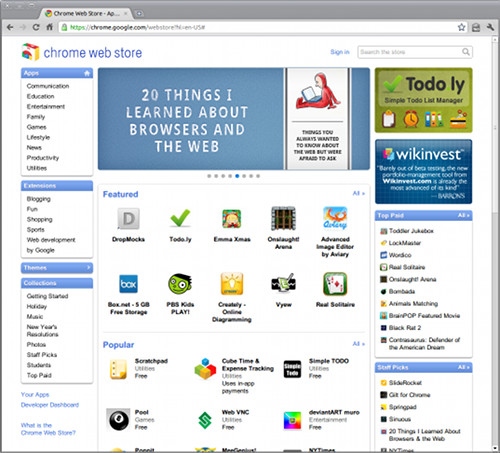Still watching the Google Chrome Team Livestream. Google is on a massive release streak that clarifies their strategic outlook for the next two years. In two days we’ve had: Android 2.3 and a short Android 3.0 sneak-peek, the eBook store, (V8) Crankshaft, Chrome Webstore and Chrome OS.
The Store.

With the Chrome Web store, Google is attempting to replicate the AppStore model on the Web. From the point of view of a Web user, I find it useless, or in other words a glorified bookmarking system, coupled with a payment processing system and proprietary functionality that ties everything to Google; most of the things that the Chrome Web store offers are already here, although they are not offered by a single company. Payments, for example, take place all the time through trusted third-party payment processors, including Google. Discovery of new sites/apps happens daily through social bookmarking sites like Digg and Reddit, a number of trusted publications, word of mouth etc. There’s no doubt that a web site/application directory, or a fancier way to ‘bookmark’ web apps might be useful, but that would be a much more noble proposition to what Google talked about today and it would need to be done in a cross-browser way that would be inclusive to other browser developers and the community as a whole.
The apps. The Web. Openness and Google.
The NY Times Chrome application is just a modern website I visited while the presentation was taking place. Amazon’s WindowShop is a Flash client for their store. A flash game could reside behind a third-party game portal. None of those things have anything to do with the ‘Store’.
The Chrome ‘Webstore’ makes things ‘easier’ and more streamlined for Chrome users and developers, but flies in the face of the openness and independence of the Web. It introduces a new dependency, Google Chrome for its proprietary functionality and Google, for its payment processing services and at the same time raises barriers to entry to other browsers that might very well be standards compliant, but lacking the ‘Web store’ functionality. It ties web applications, their users and developers to Google, even if that’s in the form of the additional work that developers will have to do to provide versions of their applications for the Chrome Web store, the ‘Web’ or even other ‘Stores’, if and when they appear.
There’s no need for any new ‘dependencies’, no need for web apps making use of ‘proprietary’ functionality found in any one browser; we’ve had that nightmare with IE for many years late in the 20th century and for several years the web was the domain of IE.
Google’s intention with the Web store, however, is not at all limited to the Web. It might be that the reasons for the Webstore’s existence fail to convince, but the company’s desire clearly goes far beyond that: Google aims to provide a single place for Applications that fits their upcoming Chrome OS strategy, which, by extension, aims to centralise everything in their own data centres.
From the Web, to the OS.
Initially Google aims to steal a significant piece of the low-end consumer computing, but at the same time, they also plan to erode Microsoft’s dominance in the business market. Their cloud-based Chrome OS strategy is the means to achieve this. There are some interesting parts to a fully ‘cloud’ computing model and I am certain there are use cases where the model is useful, but I am not sure whether that should be done through a platform owned by a single company (or any company whatsoever). Having Chrome OS with an independent backend would make much more sense, at least for security conscious people or larger businesses. Google aims to become a platform company powering everyone’s machines, which — given that data will be stored on their servers and their revenue stream — might make the proposition unacceptable to many; in the presentation the emphasis on security was impressive; yet, neither encryption, nor verified boot (another name for trusted computing) make up for the inherent trust that all users will need to have for Google.
At any rate, as is usually the case everything presented seemed to be absolutely U.S. centric for the time being. I visited the Cr-48 Pilot programme registration page a mere two seconds after the QR code appeared on my screen. I was interested in registering my interest for the pilot programme. Sadly, the programme is open to US residents only, although Google seems to have messed up, as the registration form had a Country field there.
While it’d be nice to see how the Cr-48 performed in real-life situations for a few months, I cannot say I’m too fussed about not being eligible to apply for one. The Chrome browser maybe the best tool to access the Web nowadays, and hopefully it’ll continue to be developed, but Google’s strategy in conquering the OS market and the Web in one swoop seems frail at best.
